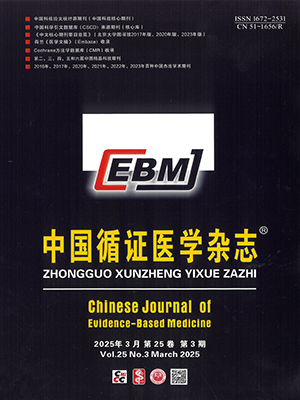| 1. |
Islami F, Torre LA, Jemal A. Global trends of lung cancer mortality and smoking prevalence. Transl Lung Cancer Res, 2015, 4(4): 327-338.
|
| 2. |
Travis WD, Brambilla E, Nicholson AG, et al. The 2015 World Health Organization classification of lung tumors: impact of genetic, clinical and radiologic advances since the 2004 classification. J Thorac Oncol, 2015, 10(9): 1243-1260.
|
| 3. |
Allemani C, Matsuda T, Di Carlo V, et al. Global surveillance of trends in cancer survival 2000-14 (CONCORD-3): analysis of individual records for 37 513 025 patients diagnosed with one of 18 cancers from 322 population-based registries in 71 countries. Lancet, 2018, 391(10125): 1023-1075.
|
| 4. |
Hirsch FR, Bunn PA. EGFR testing in lung cancer is ready for prime time. Lancet Oncol, 2009, 10(5): 432-433.
|
| 5. |
Sárosi V, Balikó Z, Smuk G, et al. The frequency of EGFR mutation in lung adenocarcinoma and the efficacy of tyrosine kinase inhibitor therapy in a hungarian cohort of patients. Pathol Oncol Res, 2016, 22(4): 755-761.
|
| 6. |
Yang X, Yang K, Kuang K. The efficacy and safety of EGFR inhibitor monotherapy in non-small cell lung cancer: a systematic review. Curr Oncol Rep, 2014, 16(6): 390.
|
| 7. |
Zhou C, Wu YL, Chen G, et al. Erlotinib versus chemotherapy as first-line treatment for patients with advanced EGFR mutation-positive non-small-cell lung cancer (OPTIMAL, CTONG-0802): a multicentre, open-label, randomised, phase 3 study. Lancet Oncol, 2011, 12(8): 735-742.
|
| 8. |
Sequist LV, Yang JC, Yamamoto N, et al. Phase Ⅲ study of afatinib or cisplatin plus pemetrexed in patients with metastatic lung adenocarcinoma with EGFR mutations. J Clin Oncol, 2013, 31(27): 3327-3334.
|
| 9. |
Migliorino MR, Santo A, Romano G, et al. Economic burden of patients affected by non-small cell lung cancer (NSCLC): the LIFE study. J Cancer Res Clin Oncol, 2017, 143(5): 783-791.
|
| 10. |
Chouaïd C, Molinier L, Combescure C, et al. Economics of the clinical management of lung cancer in France: an analysis using a Markov model. Br J Cancer, 2004, 90(2): 397-402.
|
| 11. |
Vergnenegre A, Corre R, Berard H, et al. Cost-effectiveness of second-line chemotherapy for non-small cell lung cancer: an economic, randomized, prospective, multicenter phase III trial comparing docetaxel and pemetrexed: the GFPC 05-06 study. J Thorac Oncol, 2011, 6(1): 161-168.
|
| 12. |
McGuire A, Martin M, Lenz C, et al. Treatment cost of non-small cell lung cancer in three European countries: comparisons across France, Germany, and England using administrative databases. J Med Econ, 2015, 18(7): 525-532.
|
| 13. |
GBD 2015 Mortality and Causes of Death Collaborators. Global, regional, and national life expectancy, all-cause mortality, and cause-specific mortality for 249 causes of death, 1980-2015: a systematic analysis for the Global Burden of Disease Study 2015. Lancet, 2016, 388(10053): 1459-1544.
|
| 14. |
国家医疗保障局. 关于将17种抗癌药纳入国家基本医疗保险、工伤保险和生育保险药品目录乙类范围的通知. 中老年保健, 2018, (12): 6.
|
| 15. |
Eisenhauer EA, Therasse P, Bogaerts J, et al. New response evaluation criteria in solid tumours: revised RECIST guideline (version 1. 1). Eur J Cancer, 2009, 45(2): 228-247.
|
| 16. |
National Cancer Institute. Common terminology criteria for adverse events v. 3.0 and v. 4.0 (CTCAE).
|
| 17. |
Castelli C, Combescure C, Foucher Y, et al. Cost-effectiveness analysis in colorectal cancer using a semi-Markov model. Stat Med, 2007, 26(30): 5557-5571.
|
| 18. |
龙泳, 刘学东, 段利平, 等. 失能调整寿命年与人力资本法结合估计间接经济负担的研究. 中华流行病学杂志, 2007, 28(7): 708-711.
|
| 19. |
Nafees B, Lloyd AJ, Dewilde S, et al. Health state utilities in non-small cell lung cancer: an international study. Asia Pac J Clin Oncol, 2017, 13(5): e195-e203.
|
| 20. |
Nafees B, Stafford M, Gavriel S, et al. Health state utilities for non small cell lung cancer. Health Qual Life Outcomes, 2008, 6: 84.
|
| 21. |
Grutters JP, Joore MA, Wiegman EM, et al. Health-related quality of life in patients surviving non-small cell lung cancer. Thorax, 2010, 65(10): 903-907.
|
| 22. |
Chouaid C, Agulnik J, Goker E, et al. Health-related quality of life and utility in patients with advanced non-small-cell lung cancer: a prospective cross-sectional patient survey in a real-world setting. J Thorac Oncol, 2013, 8(8): 997-1003.
|
| 23. |
Labbé C, Leung Y, Silva Lemes JG, et al. Real-world EQ5D health utility scores for patients with metastatic lung cancer by molecular alteration and response to therapy. Clin Lung Cancer, 2017, 18(4): 388-395.
|
| 24. |
Brown J, Cook K, Adamski K, et al. Utility values associated with advanced or metastatic non-small cell lung cancer: data needs for economic modeling. Expert Rev Pharmacoecon Outcomes Res, 2017, 17(2): 153-164.
|
| 25. |
Alkhatib NS, Ramos K, Erstad B, et al. Pricing methods in outcome-based contracting: δ2: willingness-to-pay-based pricing. J Med Econ, 2020, 23(11): 1223-1229.
|
| 26. |
Nan X, Xie C, Yu X, et al. EGFR TKI as first-line treatment for patients with advanced EGFR mutation-positive non-small-cell lung cancer. Oncotarget, 2017, 8(43): 75712-75726.
|
| 27. |
Shi Y, Zhang L, Liu X, et al. Icotinib versus gefitinib in previously treated advanced non-small-cell lung cancer (ICOGEN): a randomised, double-blind phase 3 non-inferiority trial. Lancet Oncol, 2013, 14(10): 953-961.
|
| 28. |
张谦, 周文. 非小细胞肺癌患者的新选择-盐酸埃克替尼. 药学研究, 2013, 32(2): 121-124.
|
| 29. |
Shi YK, Wang L, Han BH, et al. First-line icotinib versus cisplatin/pemetrexed plus pemetrexed maintenance therapy for patients with advanced EGFR mutation-positive lung adenocarcinoma (CONVINCE): a phase 3, open-label, randomized study. Ann Oncol, 2017, 28(10): 2443-2450.
|
| 30. |
戴冰, 占美, 刘怿晗, 等. 吉非替尼治疗晚期非小细胞肺癌药物经济学研究的循证评价. 中国药业, 2020, 29(15): 97-104.
|
| 31. |
牟菲, 关月, 郭桂萍, 等. 埃克替尼治疗晚期非小细胞肺癌的快速卫生技术评估. 中国新药杂志, 2022, 31(9): 913-919.
|
| 32. |
纪汶君, 门鹏, 王玉刚. 埃克替尼治疗非小细胞肺癌的快速卫生技术评估. 中国药师, 2022, 25(1): 102-112.
|




